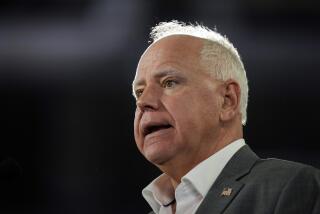Candidates Have Answers -- Just Not to the Questions
- Share via
Does President Bush’s foreign policy seem somehow reminiscent of Nazi Germany’s?
Gen. Wesley K. Clark fielded essentially that question from NBC anchor Tom Brokaw at the most recent Democratic presidential debate. But Clark did not respond directly, choosing instead to turn his answer into a withering critique of what he termed Bush’s “reckless” and “irresponsible” Iraq policy.
In his nonresponsive response, Clark followed a practice that all of the Democratic contenders have used, at least on occasion, in more than 20 debates. And leading into tonight’s ABC “Nightline” debate in New Hampshire, more of the same is expected.
The art of the dodge is so time-honored among candidates of both parties that candidates, moderators, reporters and the public have long stopped expecting a direct answer.
Though Bush has not been in a campaign debate since the 2000 election, he’s not immune to dodging tough queries. At a late-October news conference, he pointedly declined to answer a reporter who asked whether there would be fewer troops in Iraq a year from now.
“That’s a trick question,” the president said.
Political discourse has been transformed substantially since Sen. John F. Kennedy and Vice President Richard Nixon behaved like high school civics students in their 1960 debates, keeping virtually every answer on point.
Among the chief causes of the shift: a 24-hour television news industry that depends on short, pithy retorts, and media consultants who tell their candidates that the public will not be nearly as offended by their equivocations as by pushy journalists who demand answers.
The large field of nine Democrats running this year has exacerbated the phenomenon. In a 90-minute debate, each would-be president typically gets less than 10 minutes on camera. With so little time, they are advised to hammer on just one or two key points; never mind what they are asked.
“Regardless of what my first question is Tuesday, most of these candidates are going to make that ‘opening statement,’ come hell or high water,” said “Nightline” host Ted Koppel, who will moderate this evening’s debate. He has moderated debates for more than 20 years and is known as a tough inquisitor.
“Even if I ask them who will win the Redskins game Sunday, they will say what they want.”
That evasiveness appalls some students of the presidency.
“They would do far better to speak from the heart to the American people,” said Allan J. Lichtman, a presidential historian at American University in Washington. “A year after the election Al Gore said, ‘Gee, I should have spoken from the heart,’ and he was right. These candidates don’t do one bit of good being managed.”
But Michael Genovese, a political science professor at Loyola Marymount University in Los Angeles who writes about the presidency, said “smart and disciplined” candidates stay on their message.
“It’s in the interest of the candidates to not answer the question and to stay on their point. And they will keep pounding and keep pounding until they are out of the race or they succeed,” Genovese said.
Some questions almost beg a nonresponse. At the MSNBC debate last month, Brokaw asked Rep. Richard A. Gephardt whether Israeli Prime Minister Ariel Sharon was a “man of peace.”
Although Brokaw made two or three runs at Gephardt and insisted the question was not “loaded,” several commentators said a “yes” or “no” response would not only have been a diplomatic blunder, but dicey presidential politics as well, given the sensitivity around Israeli-Palestinian relations.
“I thought Gephardt had a legitimate grievance on that one,” said Kathleen Hall Jamieson, director of the Annenberg Public Policy Center at the University of Pennsylvania. The candidate responded by talking more generally about what he said were Bush’s failures in the Middle East, and never once uttered Sharon’s name.
Clark’s fuzzy response to Brokaw’s query about Bush and the Nazis may have made less sense to the viewing public.
Brokaw described a statement by financier George Soros, a major financial contributor to the Democrats, who said some of Bush’s actions reminded him of the Nazi Germany of his youth.
Clark’s segue to safer ground was clear, if clumsy.
“Well, I haven’t seen everything George Soros has written, but he’s a very responsible man,” Clark said. “He’s done a lot of good in the world. I’ve worked with his projects in Eastern Europe. And let me tell you this about George Bush’s foreign policy....”
Only rarely in history have presidential candidates scored heavily during debates in the primary season, said Bruce Buchanan, a government professor at the University of Texas.
Ronald Reagan became one of the few exceptions during the 1980 New Hampshire primary, when he walked on stage with four candidates whom the Nashua Telegraph newspaper tried to exclude from Reagan’s debate with George H.W. Bush.
“I paid for this microphone, Mr. Green,” Reagan told the moderator, insisting the others be allowed to participate and reinforcing his image as a take-charge leader. While the candidates may resist narrowing the debate field this year as well, Koppel said the Democrats would benefit by having fewer people on stage.
But the “Nightline” veteran said he would sorely miss some of the candidates if they’re excluded, particularly the Rev. Al Sharpton.
“He can be as interesting and entertaining as he wants to be,” Koppel said, “because he has no chance of winning the nomination. God bless him. He’ll keep me awake up there.”
More to Read
Get the L.A. Times Politics newsletter
Deeply reported insights into legislation, politics and policy from Sacramento, Washington and beyond. In your inbox twice per week.
You may occasionally receive promotional content from the Los Angeles Times.











